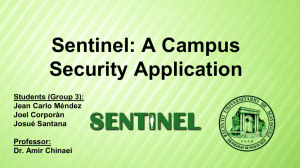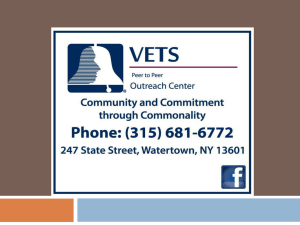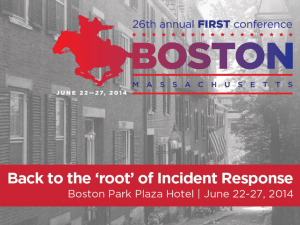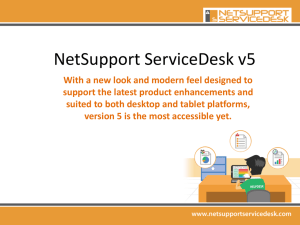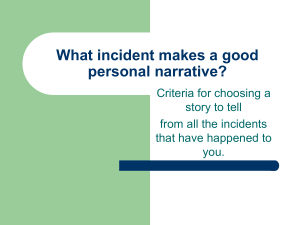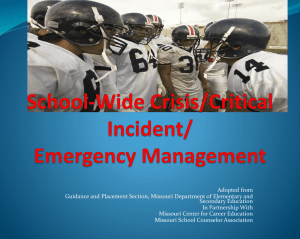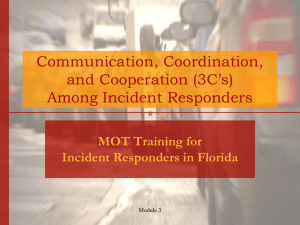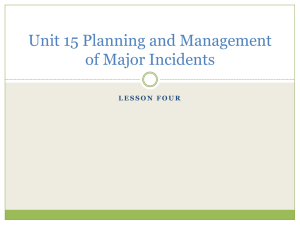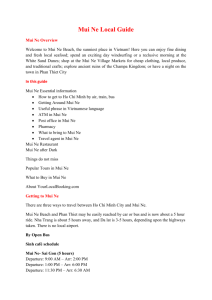MUI Rule revisions Presenter
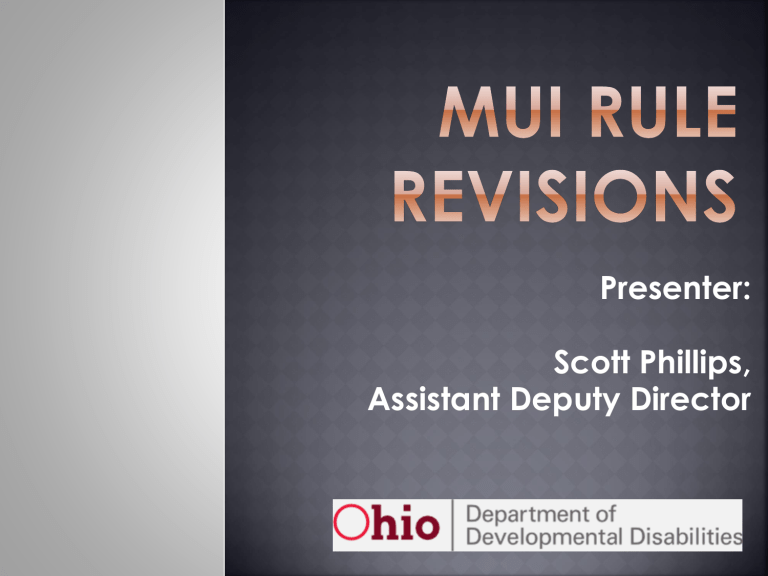
Presenter:
Scott Phillips,
Assistant Deputy Director
Great Information was shared regarding
5123:2-17-02.
Feedback was requested and received prior to and during the rule review process. The responses received by DODD regarding the current rule were extremely positive.
The majority of recommendations included clarification of certain categories and increasing efficiencies when possible.
Collaborative effort on behalf of individuals, families, providers, constituents, county boards and the department.
VERY SUCCESSFUL RULE REVIEW PROCESS!
2
Rule title to include MUI and UIs. The new title is
Addressing major unusual incidents and unusual incidents to ensure health, welfare, and continuous quality improvement.
Changes to Protocols (A, B, and C category investigations.)
Peer-to-peer definition changes (Physical Abuse,
Verbal Abuse, Misappropriation). Clarifies the definition for greater consistency
Verbal Abuse definition changes
Missing Individual Definition Changes
3
Strengthening of the UI process. More incidents will be categorized as UI’s = assure process effectively addresses these incidents.
Revised communication and dispute resolution opportunities (i.e., information, appeal) for peer/guardian in a Peer-to-Peer case.
Law enforcement notifications on criminal Peer-to-
Peer cases. Local conversations to assure appropriate follow-up
Law Enforcement as an MUI – even when individual is not being served
4
Known / Unknown Injury Changes
Death- Suspicious or Accidental v.s. Natural
UI Definition
Health and Welfare
Provider Notifications
ICF Reporting Requirements
Support Broker Self Waiver
Peer to Peer Notifications
Incident Report Requirements
Quarterly to Semi Annual for MUI P& T Analysis
5
Improvements that focus on triaging incidents based on severity
Providing the right amount of safety, verification and investigation
Reducing unnecessary worry, time, and effort on paper compliance that doesn’t impact outcomes
6
Rule Reference: Pages 3-5
Cases in which the police, CSB or IA may be involved in the investigation.
Good communication and cooperation among investigative entities will be required for these investigations.
Accidental or Suspicious Death, Exploitation,
Failure To Report, Misappropriation, Neglect,
Peer to Peer Act, Physical Abuse, Prohibited
Sexual Activity, Rights Code, Sexual Abuse and Verbal Abuse
7
Rule Reference: Pages 5-6
Cases investigated by IA
Attempted Suicide, Medical Emergency,
Missing Individual, Death other than an accidental or suspicious, and Significant
Injury
8
Rule Reference: Page 6
Cases investigated by IA- Format
Requirements
Law Enforcement, Unapproved Behavior
Supports and Unscheduled
Hospitalizations.
9
Appendix C cases are Law Enforcement,
Unscheduled Hospitalizations and Unapproved
Behavior Supports. These are the only 3 categories where the Appendix C Protocol and form can be used.
Appendix C forms can be completed by the SSA and the Provider who was providing services to the individual when the incident occurred.
The IA or MUI Contact will enter the information from
Appendix C form into ITS.
The IA will be responsible for reviewing it and ensuring information is complete, incident is properly coded and meets the requirements of rule.
10
All MUI’s require an investigation meeting category A , B or C applicable requirements of this rule.
Category A Alleged Crimes (Police , CSB and
IA involvement)
Category B Investigative Agent
Category C (Format Requirements)
Investigation categories may change based on the information obtained A, B and C.
11
Rule Reference: Page 1 (C )(2)
"Agency provider" is a provider, certified or licensed by the department or a provider approved by the Ohio office of medical assistance to provide services under the transitions developmental disabilities waiver, that employs staff to deliver services to individuals and who may subcontract the delivery of services. "Agency provider" includes a county board while providing specialized services.
12
Rule Reference: page 2 (C)(10)
Independent Provider (Replaces
Individual Provider)
"Independent provider" means a selfemployed person who provides services for which he or she must be certified under rule 5123:2-2-01 of the
Administrative Code or approved by the
Ohio office of medical assistance and does not employ, either directly or through contract, anyone else to provide the services.
13
Rule Reference: Page 4(a)(vi)
(vi) Peer-to-peer act. "Peer-to-peer act" means one of the following:
(a) Exploitation
(b) Theft…The $ limit for an MUI investigation regarding peer to peer was raised from $10 to $20.
14
Rule Reference: Page 4(a)(vi)(c)
Physical act that occurs when an individual is targeting, or firmly fixed on another individual such that the act is not accidental or random. The incident results in an injury that is treated by a physician, physician assistant, or nurse practitioner.
Allegations of one individual choking another or any head or neck injuries such as bloody nose, a bloody lip, a black eye or other injury to the eye, shall be considered major unusual incidents.
15
Rule Reference: Page 4 (a)(vi)(c)
Minor injuries such as scratches or reddened areas not involving the head or neck shall be considered unusual incidents and shall require immediate action, a review to uncover possible cause/contributing factors, and prevention measures.
16
Rule Reference: Page 4 (a)(vi)(e)
Verbal act which means the use of words, gestures, or other communicative means to purposefully threaten, coerce, or intimidate the other individual when there is the opportunity and ability to carryout the threat.
17
Notifications shall be made to law enforcement or CSB as appropriate when an alleged crime has been committed.
(The change in peer to peer physical act definition will help assure that appropriate notification to LE and CSB occurs regarding peer to peer MUI’s.)
18
Rule Reference: Page 5 (b)(iv)
An incident that is not considered neglect and an individuals whereabouts after immediate measures taken are unknown and the individual is believed to be at or pose an imminent risk of harm to self or others.
An incident when an individual’s whereabouts are unknown for longer than the period of time specified in the individuals service plan that does not result in imminent risk of harm to self or others shall be investigated as an unusual incident.
19
Rule Reference: Page 7(c)(20)
"Unusual incident" means an event or occurrence involving an individual that is not consistent with routine operations, policies and procedures, or the individual's care or service plan, but is not a major unusual incident.
Unusual incident includes, but is not limited to: dental injuries; falls; an injury that is not a significant injury; medication errors without a likely risk to health and welfare; overnight relocation of an individual due to a fire, natural disaster, or mechanical failure; an incident involving two individuals served that is not a peer-topeer act major unusual incident; and rights code violations or unapproved behavior supports without a likely risk to health and welfare.
20
Rule Reference: Page 9 (D)(7)
For all MUIs, including those listed in paragraph (D)(4) of this rule, all providers shall submit a written incident report to the county board contact or designee no later than three p.m. the next working day following initial knowledge of a potential or determined MUI.
*Independent provider will be required to submit incident reports.
21
Rule Reference: Page 11(G)(1)(e)
Support broker for an individual enrolled in the self-empowered life funding waiver shall be notified of MUI’s. New addition with the SELF Waiver.
22
Rule Reference: Pages 21 (M)(d)
Requires the provider to investigate unusual incidents, identify the cause and contributing factors when applicable, and develop preventive measures to protect the health and welfare of any at-risk individuals.
23
Rule Reference: Page 21(M)(5)
Independent providers shall complete an incident report, notify the individual's guardian or other person whom the individual has identified, as applicable on the day an unusual incident is discovered.
Independent Providers will also maintain a log of unusual incidents.
Rule Reference: Page 21
(M)(8)
24
Rule Reference: Page 22 (P)(1)-(2)
Agency providers and county boards shall ensure staff employed in direct services positions are trained on the requirements of this rule regarding the identification and reporting of MUIs and UIs prior to direct contact with any individual.
Thereafter, staff employed in direct service positions shall receive training during each calendar year which shall include annual training on the requirements of this rule including a review of health and welfare alerts issued by the department since the previous calendar year's training.
25
Questions have arisen regarding certain changes recently made to OAC 5123: 2-
17-02 in regard to activities performed by
SSAs that are involved in reviewing MUIs and UIs.
26
The revised MUI rule permits certain incidents in the newly created Category
C to be coordinated and reviewed by the
SSA. These incidents include unscheduled hospitalizations, unapproved behavior supports, and notifications to law enforcement. Reviews of these incidents by SSAs is done as part of the service planning and monitoring process and is critical to ensuring appropriate service delivery for individuals. As such, SSAs are not “conducting” investigations, but are performing TCM reimbursable activities.
27
Case notes should reflect the appropriate activity such as monitoring and follow-up pursuant to OAC 5101:3-48-01 section
(D)(1)(d) (iii). This includes the integration of prevention plans into the ISP and ensuring services are effectively coordinated. Activities and contacts that are necessary to ensure communication with providers, guardians and individuals related to MUIs and unusual incidents are indeed TCM reimbursable as monitoring and follow-up.
28
Unscheduled
Hospitalization Form
Unapproved Behavior
Support Form
Law Enforcement Form
29
30

